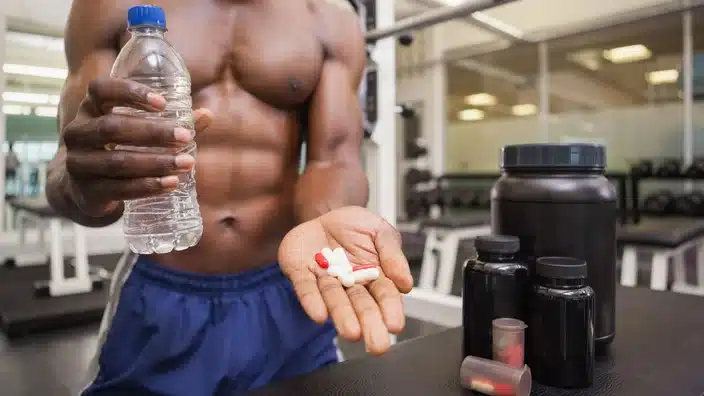The use of anabolic steroids is a topic of increasing concern in the bodybuilding community due to its implications for cardiovascular health. Anabolic steroids, synthetic derivatives of testosterone, are among the most commonly used performance-enhancing drugs in the world of competitive sports and bodybuilding. Their ability to promote muscle growth, increase strength, and reduce recovery times makes them appealing to bodybuilders aiming to achieve peak physical condition. However, the benefits come with significant risks, particularly to heart health.
The relationship between steroid use and cardiovascular health is complex and influenced by various factors including dosage, duration of use, and individual predisposition to heart disease. Studies have consistently shown that long-term steroid use can lead to an increased risk of cardiovascular events, such as myocardial infarction, stroke, and cardiomyopathy. These risks are compounded by a lifestyle that may include other harmful practices, such as the use of additional supplements, stimulants, and specialized diets that could further stress the cardiovascular system.
Bodybuilders considering the use of steroids for performance enhancement must balance the potential benefits with the inherent risks. While there is an undeniable link between anabolic steroid use and cardiovascular complications, more research is needed to understand the full extent of these effects. In the meantime, regulations and legal considerations aim to curb the non-medical use of these substances, and prevention strategies focus on raising awareness and promoting cardiovascular health monitoring for athletes at risk.
Quick Summary
- Anabolic steroids pose significant risks to cardiovascular health in bodybuilders.
- The impact of steroids on heart health is influenced by various personal and lifestyle factors.
- Prevention strategies emphasize the importance of awareness and health monitoring in at-risk athletes.
Understanding Steroids

Anabolic steroids, formally known as anabolic-androgenic steroids (AAS), are synthetic derivatives related to the male sex hormone—testosterone. They aim to mimic the anabolic properties (tissue-building) of the hormones, while minimizing androgenic (masculinization) effects.
Anabolic effects include muscle growth and recovery, while androgenic effects involve male secondary sex characteristics. Bodybuilders typically pursue the anabolic effects for muscle gain. These steroids work by binding to androgen receptors, which are distributed throughout the body, including muscle cells, and activate pathways that lead to increased protein synthesis and muscle growth.
Androgenic Effects:
- Deepening of the voice
- Growth of facial hair
Given their potent biological effects, these substances are often misused for aesthetic and performance enhancement purposes. However, their non-medical use is associated with significant side effects and health risks, particularly pertaining to cardiovascular health.
A list of common anabolic steroids includes:
- Testosterone
- Nandrolone
- Stanozolol
- Trenbolone
It is crucial to understand that although anabolic steroids can have medical applications, their use in bodybuilding as performance enhancers is generally done without medical supervision, which can lead to dangerous health outcomes.
Steroid Use in Bodybuilding

Anabolic steroids have become a controversial aspect of bodybuilding, often connected to gaining muscle mass and enhancing performance.
Prevalence and Patterns of Use
In bodybuilding, the prevalence of anabolic steroid use has been noted to be significantly high, with users seeking muscle hypertrophy for an improved appearance. Patterns of use vary, ranging from cycling (periods of use followed by abstinence) to stacking (combining different steroids). Illicit use among young athletes and amateur bodybuilders is of particular concern due to the associated health risks.
- Cycling: Typically involves taking multiple doses over a certain period, followed by a steroid-free period to allow the body to recover.
- Stacking: Users combine various types of steroids to maximize muscle gain or therapeutic benefits.
Training and Performance
Anabolic steroids are used in bodybuilding to increase power and endurance, thereby enhancing training intensity and performance. Athletes might turn to steroids for their ability to increase muscle mass more quickly, which can be critical in competitive bodybuilding. However, despite the short-term benefits, the abuse of steroids can lead to serious cardiovascular health issues.
- Power: Steroids can contribute to gains in strength and explosive power, beneficial in lifting heavy weights.
- Endurance: Some users report increased endurance, allowing for more rigorous and prolonged training sessions.
Cardiovascular Risks Associated with Steroid Use

The use of anabolic steroids in bodybuilders is linked to various cardiovascular risks, such as hypertension, altered lipid profiles, arrhythmias, and heart enlargement, which may lead to severe cardiac conditions.
Blood Pressure and Hypertension
Anabolic steroids can increase blood pressure, which heightens the risk of hypertension. Prolonged hypertension can subsequently lead to coronary artery disease and greater chances of experiencing a stroke.
Cholesterol and Lipid Profile Alterations
Steroid use is associated with detrimental changes in cholesterol levels, including increased LDL (“bad” cholesterol) and decreased HDL (“good” cholesterol). These alterations can accelerate the process of atherosclerosis, a major contributor to cardiovascular disease.
Arrhythmias and Heart Rhythm Disorders
Steroids may cause heart rhythm disorders, such as arrhythmias, which can lead to sudden cardiac death. Research indicates a link between steroid use and prolongation of the QT interval, which is a marker for the potential development of severe arrhythmias.
Cardiac Hypertrophy and Heart Failure
Chronic anabolic steroid use can lead to cardiac hypertrophy, specifically left ventricular hypertrophy. This condition increases the risk of heart failure and cardiomyopathy, which can manifest in reduced cardiac function and potentially sudden death.
References
Health Consequences Beyond the Heart

Steroids can significantly impact multiple body systems apart from cardiovascular health. They have been associated with complications in reproductive and renal functions, hepatic and metabolic processes, and psychological and emotional states.
Reproductive and Renal Effects
Anabolic steroid use has been linked to several reproductive issues, such as hypogonadism and erectile dysfunction. These substances affect the hypothalamic-pituitary-gonadal axis, leading to decreased testosterone production and altered sexual function. Renal toxicity can also result from long-term steroid use, sometimes causing severe renal diseases.
- Hypogonadism
- Erectile Dysfunction
- Renal Toxicity
Hepatic and Metabolic Impact
Steroid abuse may induce significant hepatic strain, with users at increased risk for liver diseases like hepatocellular carcinoma. Metabolically, steroid use can exacerbate the risk of developing conditions such as diabetes, as it interferes with the body’s glucose regulation.
- Hepatic Strain
- Hepatocellular Carcinoma
- Risk of Diabetes
Psychological and Emotional Well-being
Steroids can also affect a user’s mental health, with studies pointing to an increased risk of psychological effects such as aggression and mood swings. The mind-body connection underscores the importance of considering these potential consequences in the context of overall health.
- Aggression
- Mood Swings
Regulations and Legal Considerations

Anabolic-androgenic steroids (AAS) are classified as Schedule III controlled substances in the United States. Under the Controlled Substances Act, their possession without a valid prescription is illegal. Legal consequences for possession or distribution may include fines and imprisonment. Healthcare providers may prescribe AAS for legitimate medical purposes, such as testosterone therapy for hypogonadism or other hormone deficiencies, but the nonmedical use of these substances is prohibited.
In competitive sports, doping regulations are stringent. Significant entities like the World Anti-Doping Agency (WADA) maintain a list of prohibited substances, including various AAS such as nandrolone decanoate and performance-enhancing drugs like spironolactone, categorized as masking agents. Athletes found to be in violation of these regulations can face suspensions, bans from competition, and reputational damage.
AAS Abuse and Dependence has been a growing concern, as it poses significant health risks, including cardiovascular issues. The side effects of misusing such substances may lead to severe legal actions taken by authorities to combat illicit trade and use.
The table below highlights key points within the legal framework:
| Substance | Legal for Medical Use | Status in Sports | Consequences of Illegal Use |
|---|---|---|---|
| Anabolic-androgenic steroids | Yes, with prescription | Banned | Fines, imprisonment |
| Performance-enhancing drugs | Selectively, with prescription | Banned | Suspensions, bans from sport |
| Doping agents like spironolactone | Yes, for non-sporting medical conditions | Banned | Fines, imprisonment |
Within the recreational scene, enforcement efforts target the illicit distribution of these substances. The term recreational use is often associated with abuse and misinformation, leading potentially to anabolic-androgenic steroid dependence. Education and legal measures continue to be essential in addressing these concerns.
References
- World Anti-Doping Agency. Prohibited List. https://www.wada-ama.org/en/content/what-is-prohibited
Prevention and Treatment of Steroid-Related Complications

Awareness of the cardiovascular effects stemming from anabolic steroid abuse is critical for both prevention and treatment. Bodybuilders who use steroids should be informed of the potential risks, including acute myocardial infarction, myocardial ischemia, and exercise-induced cardiotoxicity. Regular medical monitoring is advised to detect early signs of cardiovascular complications.
For prevention, bodybuilders are encouraged to:
- Undergo periodic cardiac evaluations.
- Receive education on the signs of cardiac distress.
Treatment options for those experiencing steroid-related cardiac issues include:
- Cessation of Anabolic Steroids: Discontinuing the use of steroids is the primary step in treatment to prevent further cardiac damage.
- Medications: Prescriptions like beta-blockers, ACE inhibitors, or statins may be used to manage specific cardiovascular symptoms.
- Lifestyle Modifications: Adopting a heart-healthy diet, engaging in aerobic exercise within safe limits, and avoiding tobacco and illicit drugs can reduce the risk of complications.
Long-term steroid use can lead to chronic administration effects such as cardiac autonomic dysfunction and alterations in collagen, which can impact tendons. Patients may require:
- Rehabilitation programs focusing on joint and tendon health.
- Supplements to support tendon repair and cardiac function.
In cases of acute hepatic injury or apoptosis, medical intervention becomes necessary. Treatment might involve:
- Hepatoprotective agents for liver damage.
- Cardioprotective strategies to minimize apoptosis and preserve cardiac function.
References
[1] Cardiovascular Toxicity of Anabolic Steroids: https://www.ncbi.nlm.nih.gov/pmc/articles/PMC385534/ [2] Anabolic Steroid-Induced Cardiomyopathy: https://pubmed.ncbi.nlm.nih.gov/15316909/ [3] Steroid Use and Long-term Health Risks in Former Athletes: https://www.sciencedirect.com/science/article/abs/pii/S1440244020300735 [4] Hepatotoxicity Associated with Illicit Use of Anabolic Androgenic Steroids in Doping: https://www.ncbi.nlm.nih.gov/pmc/articles/PMC6324837/
References
Frequently Asked Questions

In this section, we answer common queries regarding the impact of anabolic steroids on cardiovascular health in bodybuilders, suggesting measures for protection, understanding risks associated with specific steroids, and addressing concerns for those with pre-existing heart conditions.
What are the effects of anabolic steroids on cardiovascular health in bodybuilders?
Anabolic steroids can lead to an increased risk of cardiovascular disease in bodybuilders. They may cause changes in cholesterol levels, including a decrease in HDL and an increase in LDL, which can lead to atherosclerosis.
How can bodybuilders protect their heart health while using anabolic steroids?
Bodybuilders may protect their heart health by using steroids under medical supervision, adhering to recommended doses, and engaging in a cardiovascular exercise regime. Regular health check-ups and monitoring of heart function are also crucial.
Are certain steroids more likely to cause heart attacks in athletes?
Certain oral anabolic steroids, like C17-alpha alkylated androgens, are more hepatotoxic and potentially increase the risk of heart attacks compared to non-alkylated injectable forms.
What is the association between steroid use and the risk of cardiac hypertrophy?
Steroid use is associated with an increased risk of cardiac hypertrophy, as steroids can cause the heart muscle to enlarge and potentially lose elasticity, which may impair its functioning.
Can individuals with pre-existing heart conditions safely take anabolic steroids?
Individuals with pre-existing heart conditions should exercise extreme caution and generally avoid anabolic steroids, as steroids can exacerbate heart conditions and pose significant health risks.
What impact do anabolic steroids have on blood pressure and heart rate?
Anabolic steroids can lead to an increase in blood pressure and heart rate, which strains the cardiovascular system and increases the risk of heart disease and stroke.
Dr. Grant Fourie, a specialist in male hormones, is based in Cape Town, South Africa. He provides comprehensive treatments for conditions related to low testosterone, such as erectile dysfunction, fatigue, and mood changes. His methods include hormone replacement therapy and other modern treatment options.
Contact me via email or phone to book personal appointment in my clinic: The Village Square, Cape Town - South Africa



